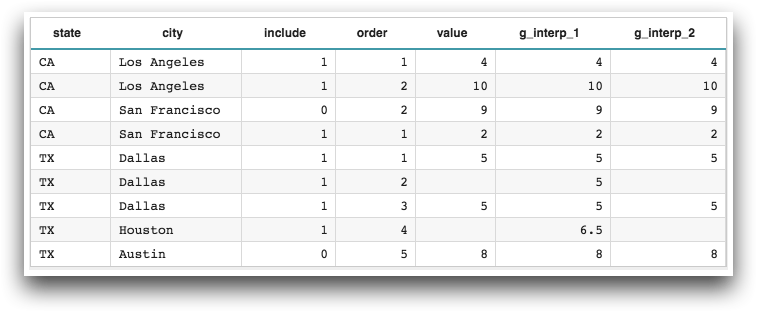g_interp(G;S;O;X;N)
Returns interpolations for N/A values in a given group.
Function type
Vector only
Syntax
g_interp(G;S;O;X;N)Input
| Argument | Type | Description |
|---|---|---|
G |
any | A space- or comma-separated list of column names Rows are in the same group
if their values for all of the columns listed in If If any of the columns listed in |
S |
integer | The name of a column in which every row evaluates to a 1 or 0, which determines
whether or not that row is selected to be included in the calculation If
If any of the values in
|
O |
integer | The name of a column that determines the row order within a particular group
and the spacing of values for the purpose of interpolation If If any of the values in |
X |
integer or decimal | A column name |
N |
integer | A value that indicates how N/A values are interpolated or extrapolated based on
nearby values, using N-order interpolationValid values are:
Note: If omitted,
N defaults to 1. |
Return Value
For every row in each group defined by G and ordered by O
(and for those rows where S=1, if specified),
g_interp returns the decimal value of the current row in
X, if it is not N/A. Otherwise, N/A values in X are
interpolated or extrapolated based on nearby values, using N-order
interpolation (i.e., N=0: previous value;
N=1: linear interpolation;
N=2: quadratic;
N=3: cubic splines).
Sample Usage
<base table="pub.doc.samples.ref.func.g_func_time_series_sample_usage"/> <willbe name="g_interp_1" value="g_interp(state;include;order;value;1)"/> <willbe name="g_interp_2" value="g_interp(state city;include;order;value;2)"/>

Additional Information
- The
t_version of this function defaults theGargument and omits theSargument. The default forGis set at table load time based on the organization of the table.
